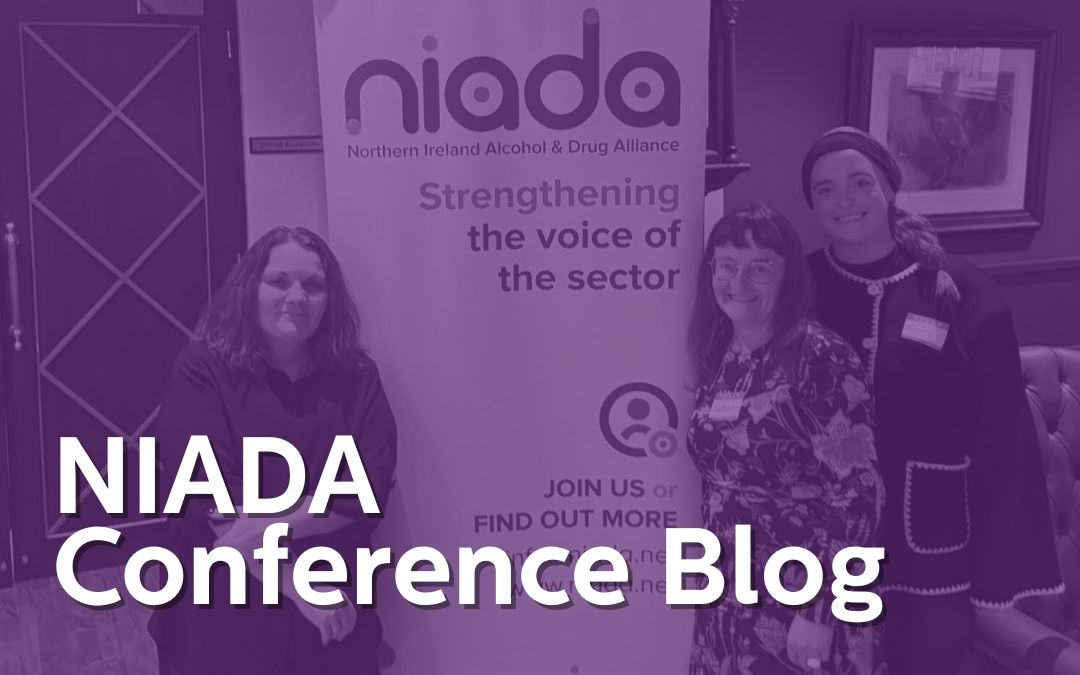Inspire’s Insights and Information Manager, Kiara Moore, reflects on her attendance at this week’s NIADA conference and the important conversations that place there.
On Wednesday 15th October, my colleagues and I attended the NIADA conference at the Dunadry Hotel in Templepatrick. This crucial event’s theme, Questions about The Price of Pills: History, Trends, and Frontline Perspectives?, offered invaluable insights into the rapidly changing landscape of drug consumption, where the distinction between legal prescriptions and dangerous misuse is now perilously thin.
NIADA | Northern Ireland Alcohol and Drugs Alliance
We took away a number of critical points and calls to action:
Prescription drug deaths are on the rise
The conference opened with a stark warning from Joseph McCrisken, the Senior Coroner for Northern Ireland. He confirmed that prescription drug deaths are increasing and stated that pregabalin is the most frequently seen prescription medication involved in these fatalities. This isn’t just an issue of illegal street drugs; risk increasingly lies within our home medicine cabinets.
A push to reclassify over-the-counter codeine
A major focus was the misuse of common medications. Dr. Carolyn Adgey, a gastroenterology consultant working in the Belfast Health and Social Care Trust, along with two of her colleagues, presented compelling research on the harm caused by the misuse of over-the-counter codeine/ibuprofen-combination medications. This study will be published later this month and is set to drive significant policy change:
- New referrals – The researchers are developing a single pathway into which community pharmacies can refer people struggling with problematic codeine use.
- Prescription-only status – They are also requesting that the Advisory Council on the Misuse of Drugs consider reclassifying all over-the-counter codeine products as prescription-only medications. This would represent a major step towards limiting access and preventing harm.
The fight against illegal online pharmacies
The dangers aren’t limited to what’s on pharmacy shelves. Peter Moore of the Medicines Regulatory Group highlighted the massive scale of illegal imports. He revealed that Operation Pangea XVII resulted in the seizure of counterfeit medicines with a staggering street value of approximately £1.1 million, thus underlining the vital, ongoing battle against online purchases.
Hundreds of thousands of counterfeit and illicit drugs seized | Department of Health
Policy and Health Debates
Joseph, Carolyn and Peter then participated in Q&A session, during which they addressed a variety of thorny public policy issues:
- Decriminalisation – Questions were raised about adopting a system of drug decriminalisation, similar to the one operating in Portugal. The responses served as an acknowledgment that the Misuse of Drugs Act 1971 may no longer be fit for purpose and could require improvement.
- Anti-depressants and suicide – On the complex topic of the link between suicide and prescription anti-depressants, the general feelings was that a direct, causal link is hard to prove. Most of the time, fatalities are the result of poly-drug use (the use of multiple substances), complicating the picture.
- Social deprivation and drug deaths – The panelists stated that people living in socially deprived areas are much more likely to die from drug use than their less deprived peers. However, none of them could point to prescription drugs as a specific cause such deaths.
The blurring lines
The overarching conclusion was clear: the dividing lines between legal, illegal, prescription and non-prescription drugs are becoming dangerously blurred. The growing misuse of prescription medication is a pervasive public health crisis that requires continued attention, research and collaborative action from key stakeholders: coroners, doctors, enforcement agencies and policymakers.
The discussion continues.
